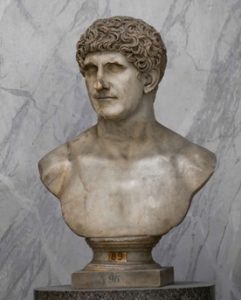When one pictures a Greek city-state, one pictures a beautiful city with a great leader to guide it, to give it courage in battle, and most importantly, to give its people hope. This Greek city-state was Athens, and this great leader was Pericles. Born in Athens in 495 B.C.E., Pericles was a prominent and influential statesman, orator, and general of the very powerful Athens.1 Pericles was a strong believer in the arts, literature, and philosophy. He was responsible for the full development of the Athenian democracy that shaped Athens’ politics and culture.2 Although Athens was enjoying a golden age while led by Pericles, this soon came to an end and thus began the fall of Athens.

That fall began in 431 B.C.E. when the 27 year long Peloponnesian War began. This long and bloody war was between the two most dominant Greek city-states, Athens and Sparta, along with each side’s allies. The war began when conflicts arose after the Greco-Persian Wars. Both Athens and Sparta longed for dominance, and in May of 431 B.C.E., war broke out between them. Pericles knew Athens’ strength was in their navy, so his strategy was to avoid Sparta on land, because he knew that on land, Athens would be no match for Sparta. What he failed to realize, however, is that crowding the population of Athens behind its Long Walls would be deadly if disease ever broke out in Athens while Sparta had it besieged.

In an attempt to please his people and praise those who had fallen in the war, Pericles gave a funeral oration in which he spoke highly of those who had given their lives for the democracy. In his speech, he tried to regain the peoples’ trust and remind them of the many victories they had had that were led by him. Pericles’ praised the Athenian people and spoke of how proud he was of them and how far they had gotten thus far. He gave Athens the title of being a model for the other surrounding Greek city-states because Athens showed its dominance. He also went on to compare Athens to Sparta. Sparta focused only on their strong and strict military whereas Athens focused on its city and the helping of each other as one in times of need, which only makes them stronger because they are “just as brave” as Pericles states.3
After cruising around Peloponnese as Pericles had ordered, he arrived in Attica where the plague began to appear among the Athenians. Sickness spread fast and there was nothing the Athenians could do to stop it. Physicians became infected and died much faster than other people because they were exposed to the sick more often. Not many survived this plague, but Thucydides, a general and historian of Athens, lived after having contracted the plague and lived to tell the tale of the Peloponnesian War. His history of this war is contained in The History of the Peloponnesian War. In this book, he writes of the chronological order of the war and the downfall of Athens due to the plague. Thucydides writes that while the Peloponnesians invaded Attica, the Athenians left and fled to their ships. Countless Athenian people were dying in battle and from the plague. The Peloponnesians feared the disease and watched as burials went on, but remained about forty days in Attica ravaging through the town.4

After the second invasion of Athens by the Peloponnesians, the Athenians began putting more blame on Pericles for declaring and leading a war that brought great suffering to the people of Athens. They began blaming Pericles for the death of one-quarter of its population. After about two years, the great general and leader of Athens was no longer wanted and was not selected to continue being their general the following year.5 What no one knew, however, and what is still a debate to this day, is what the plague really was. No one knows what disease or diseases were responsible for this plague. There have been ongoing studies to find what diseases could have possibly been the cause of the numerous deaths. Although some results have been discovered, there is no clear answer to the ongoing question: what was the infamous death that killed a third of the population of Athenians? The most common and most discussed diseases among scholars for the most reasonable explanations for the plague include: bubonic plague, influenza, typhoid fever, smallpox, epidemic typhus, and measles.6 Any of these diseases could be the cause of the plague, but there is not enough microbiologic evidence to pinpoint which disease or diseases specifically were the cause of the Athenian plague. This lack of evidence is the reason for the constant disagreement between scholars.
The plague, along with the battles fought during the war, killed a great portion of the people of Athens, and as the Athenians became weaker and weaker, they received even worse news. Pericles contracted the plague, and unlike Thucydides, he did not recover and in fact died in 429 B.C.E. leaving Athens without a general, and to fend for themselves. After his death, the government of Athens became unstable and was not able to get organized in order to continue fighting the war. With the constant invasions, people still dying from the plague, and the death of Pericles, the Athenians continued fighting until a decade and a half later, they surrendered. By the time the Peloponnesian War ended in 404 B.C.E., Athens had fallen leaving Greece weak and fractured. The fall of Athens set off chain reaction for the fall of Sparta, then eventually, the end of Classical Greece.
- New World Encyclopedia, April 2015, s.v. “Pericles.” ↵
- Encyclopædia Britannica , April 2017, s.v. “Pericles,” by David Malcolm Lewis. ↵
- Salem Press Encyclopedia, January 2017, s.v. “Analysis: Pericles’ Funeral Oration,” by Charles Forster Smith. ↵
- Thucydides, and Richard Crawley, The History of the Peloponnesian War (Auckland, N.Z.: The Floating Press, 2008), 64. ↵
- Salem Press Encyclopedia, January 2016, s.v. “Peloponnesian War,” by Jeffrey Buller. ↵
- Burke A. Cunha M.D., The Cause of the Plague of Athens: plague, typhoid, typhus, smallpox, or measles? (Infectious Disease Clinics of North America, 2004), 30. ↵



56 comments
Carlos Hinojosa
I think what a lot of people don’t realize is that Athens by today’s standards and the standards at the time too, they were the bad guys in the war. Sparta went to war with Athens because they were tired of Athens bully tactics and were kind of asked by the other city states to stop them. Athens would basically act like pirates and thugs that would ask for protection money from all their neighbors, Sparta was just the one that shoved back. People assume that just because Athens was a democracy that they were automatically the good guy.
Micheala Whitfield
Greece is so full of beauty and tragedy. I enjoyed this article. Greek history runs deep because it’s an Ancient City. I like your ending sentence, “the end of Classical Greece.” Classical Greece is to be thought of gods and luxury, art and wine, money and growth. To be wiped out not only by your own race in a war over power, but to also be hit upon by mother nature and her creations. I wonder if people panicked as much as everyone has done in America? Your article made me think of now and we are lucky for the technology we have today. Back in that era, they didn’t have that and how they found out was the contact of others. Great article.
CLAYTON KIETH EDWARDS
Plato in the Gorgias was unsparring in Socrates’ criticism of the political leadership of Pericles. He argued that his seeming making Athens better actually made people worse. He described the infrastructure Pericles put together as trash. He also criticised the system of jury and jury fees Pericles established as part of the leadership problem. Plato explained through Socrates that the political leadership of Athens during this time was built on catering and flattery, making things pleasant while ignoring the needs and requirements of justice with medicine and legislating for the good. Further, I get the sense that the sense of philosophy as the pursuit of knowledge was lost and the education of the young because too entrusted to sophists who manufactured and merchandised their contrived knowledge of virtues and thereby acquired material advantage by making and compounding controversies. If the education system was failing, democracy itself could not be too far away from disaster. Indeed, Athens lost its’ political skill with its’ loss of philosophy.
Edith Santos Sevilla
After people working so hard to construct the city and build it to their glory, the war started to destroyed the city, but nature made sure that the job was completed. While I was reading the article I was thinking of the possible different outcomes there could have been if one small thing changed the outcome would have been different. When the war started they might have known that if was going to led to the end of classical Greece.
Cynthia Perez
Really great article that illuminates the power behind the mass spread of a plague that completely wiped out tons of people who inhabited Athens. Of course the plague wasn’t the only reason for why Athens fell, with the invasions as well. However Im really curious as to what kind of plague it was, it had to have been a pretty powerful one to cause as much damage as it did. How something other than human impact could create so much destruction is really interesting to think about and evaluate in terms of civilizations and all.
Kimberly Parker
Honestly, when finishing this article I came to the conclusion that if the plague hadn’t hit Athens, then the outcome of the war might’ve been completely different, which could’ve altered history itself. I wonder what other events would’ve been affected if countless Athenian people hadn’t died in battle and from the plague which led to the fall of Athens. If the downfall of Athens hadn’t happened, then it the chain reaction that was set off for the fall of Sparta, and then eventually the end of Classical Greece, might not have happened
Edith Santos Sevilla
The article is very well written, it gives a good background of what led to the war and who were the parties involved. Even after so many years of the destruction, the story is still told and it is very interesting. The plague caused a lot of damage too, due to all of factors involved not only form human actions, but also the nature of science and diseases it is that the strong city of Athens weakened and led to the result. If the fall of this city is still an important factor today, I do not want to know the damage and impact that it had on the people that lived there and how important this event was. When I was reading I learned a lot of the story and its results.
Analisa Cervantes
This is a nice article and it is very well-written. Never knew much detail about the fall of Athens before reading this article. The beginning part that describes a city-state is pretty accurate to me when I think of Athens. It is sad to see a city-state and later the fall of the entire empire start from disease and war.
Emmanuel Ewuzie
Sickness can take out anybody even the best of the best. No matter how strong or great an individual, nation or country, the right virus will wipe them all out. This story reminds me of the Mongols as they were known for throwing disease-ridden deceased bodies into other civilizations in order to kill off their resistance.
Kenneth Gilley
This was a very interesting article. What was it that brought down the great city of Athens? It was not an invasion, not a new enemy weapon, and not a natural disaster. Athens was taken down by something so small it can’t be seen. It is amazing that a group of people who were so powerful in the ancient world could have been wiped out by plague. It is also very curious that modern science has yet to determine exactly what plague was the cause of the problem.